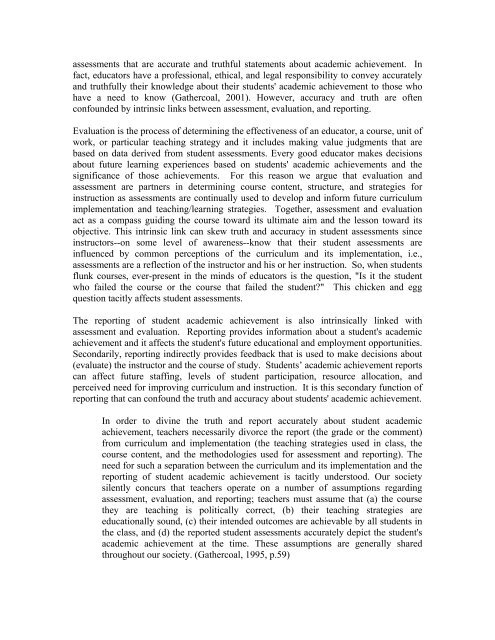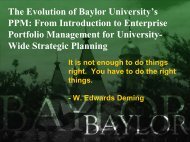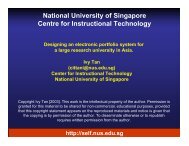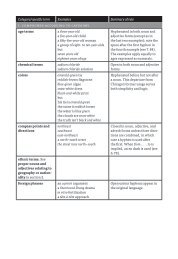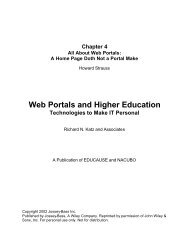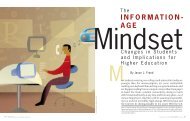Webfolios: Assessment, Evaluation and Reporting at Once - Educause
Webfolios: Assessment, Evaluation and Reporting at Once - Educause
Webfolios: Assessment, Evaluation and Reporting at Once - Educause
You also want an ePaper? Increase the reach of your titles
YUMPU automatically turns print PDFs into web optimized ePapers that Google loves.
assessments th<strong>at</strong> are accur<strong>at</strong>e <strong>and</strong> truthful st<strong>at</strong>ements about academic achievement. In<br />
fact, educ<strong>at</strong>ors have a professional, ethical, <strong>and</strong> legal responsibility to convey accur<strong>at</strong>ely<br />
<strong>and</strong> truthfully their knowledge about their students' academic achievement to those who<br />
have a need to know (G<strong>at</strong>hercoal, 2001). However, accuracy <strong>and</strong> truth are often<br />
confounded by intrinsic links between assessment, evalu<strong>at</strong>ion, <strong>and</strong> reporting.<br />
<strong>Evalu<strong>at</strong>ion</strong> is the process of determining the effectiveness of an educ<strong>at</strong>or, a course, unit of<br />
work, or particular teaching str<strong>at</strong>egy <strong>and</strong> it includes making value judgments th<strong>at</strong> are<br />
based on d<strong>at</strong>a derived from student assessments. Every good educ<strong>at</strong>or makes decisions<br />
about future learning experiences based on students' academic achievements <strong>and</strong> the<br />
significance of those achievements. For this reason we argue th<strong>at</strong> evalu<strong>at</strong>ion <strong>and</strong><br />
assessment are partners in determining course content, structure, <strong>and</strong> str<strong>at</strong>egies for<br />
instruction as assessments are continually used to develop <strong>and</strong> inform future curriculum<br />
implement<strong>at</strong>ion <strong>and</strong> teaching/learning str<strong>at</strong>egies. Together, assessment <strong>and</strong> evalu<strong>at</strong>ion<br />
act as a compass guiding the course toward its ultim<strong>at</strong>e aim <strong>and</strong> the lesson toward its<br />
objective. This intrinsic link can skew truth <strong>and</strong> accuracy in student assessments since<br />
instructors--on some level of awareness--know th<strong>at</strong> their student assessments are<br />
influenced by common perceptions of the curriculum <strong>and</strong> its implement<strong>at</strong>ion, i.e.,<br />
assessments are a reflection of the instructor <strong>and</strong> his or her instruction. So, when students<br />
flunk courses, ever-present in the minds of educ<strong>at</strong>ors is the question, "Is it the student<br />
who failed the course or the course th<strong>at</strong> failed the student?" This chicken <strong>and</strong> egg<br />
question tacitly affects student assessments.<br />
The reporting of student academic achievement is also intrinsically linked with<br />
assessment <strong>and</strong> evalu<strong>at</strong>ion. <strong>Reporting</strong> provides inform<strong>at</strong>ion about a student's academic<br />
achievement <strong>and</strong> it affects the student's future educ<strong>at</strong>ional <strong>and</strong> employment opportunities.<br />
Secondarily, reporting indirectly provides feedback th<strong>at</strong> is used to make decisions about<br />
(evalu<strong>at</strong>e) the instructor <strong>and</strong> the course of study. Students’ academic achievement reports<br />
can affect future staffing, levels of student particip<strong>at</strong>ion, resource alloc<strong>at</strong>ion, <strong>and</strong><br />
perceived need for improving curriculum <strong>and</strong> instruction. It is this secondary function of<br />
reporting th<strong>at</strong> can confound the truth <strong>and</strong> accuracy about students' academic achievement.<br />
In order to divine the truth <strong>and</strong> report accur<strong>at</strong>ely about student academic<br />
achievement, teachers necessarily divorce the report (the grade or the comment)<br />
from curriculum <strong>and</strong> implement<strong>at</strong>ion (the teaching str<strong>at</strong>egies used in class, the<br />
course content, <strong>and</strong> the methodologies used for assessment <strong>and</strong> reporting). The<br />
need for such a separ<strong>at</strong>ion between the curriculum <strong>and</strong> its implement<strong>at</strong>ion <strong>and</strong> the<br />
reporting of student academic achievement is tacitly understood. Our society<br />
silently concurs th<strong>at</strong> teachers oper<strong>at</strong>e on a number of assumptions regarding<br />
assessment, evalu<strong>at</strong>ion, <strong>and</strong> reporting; teachers must assume th<strong>at</strong> (a) the course<br />
they are teaching is politically correct, (b) their teaching str<strong>at</strong>egies are<br />
educ<strong>at</strong>ionally sound, (c) their intended outcomes are achievable by all students in<br />
the class, <strong>and</strong> (d) the reported student assessments accur<strong>at</strong>ely depict the student's<br />
academic achievement <strong>at</strong> the time. These assumptions are generally shared<br />
throughout our society. (G<strong>at</strong>hercoal, 1995, p.59)


